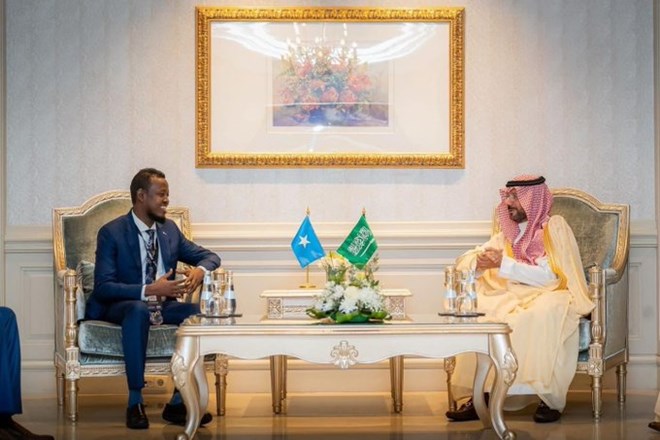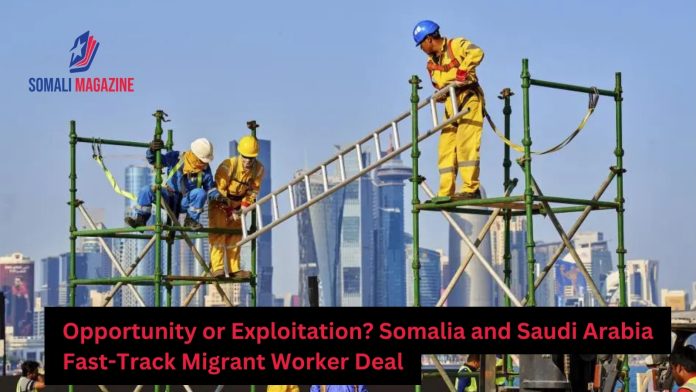Facebook Twitter (X) Instagram Somali Magazine - People's Magazine
Somalia and Saudi Arabia have agreed to accelerate the implementation of a bilateral labor agreement that will allow thousands of Somali citizens to seek legal employment in the Kingdom, despite growing concerns over worker protections. The deal, signed in December 2024, aims to create formal migration pathways for Somali workers, addressing high unemployment rates while supporting Saudi Arabia’s expanding labor market.
Somali Minister of Labour and Social Affairs Yusuf Mohamed Aden met with Saudi Deputy Minister of Human Resources and Social Development, Dr. Abdullah bin Nasser Abuthnain, in Riyadh on May 7, 2025, to reaffirm both countries’ commitment to swiftly operationalizing the agreement. The meeting, held on the sidelines of the 7th Global Occupational Safety and Health Conference, focused on expediting recruitment processes and ensuring regulatory frameworks are in place to facilitate safe labor migration.
The agreement establishes a structured framework for Somali workers, including domestic staff and professionals, to be employed in Saudi Arabia. It outlines provisions for contract regulation, monitoring mechanisms, and protections for both workers and employers. Somalia has pledged to introduce vocational training programs, legal awareness initiatives, and health screenings to prepare workers for overseas employment. Officials argue that such measures will enhance worker safety and integration into Saudi society.
However, labor unions and human rights organizations have raised concerns about the deal, warning that Somali workers could face exploitation under Saudi Arabia’s controversial kafala sponsorship system. The International Trade Union Confederation (ITUC) and the Federation of Somali Trade Unions (FESTU) have criticized the agreement, labeling it a potential gateway to labor abuses. FESTU has urged the Somali government to suspend the deal until enforceable worker protections are established, citing past cases of wage theft, unsafe working conditions, and restricted mobility for migrant workers in Saudi Arabia.

Saudi Arabia’s labor market is heavily reliant on foreign workers, with demand expected to rise under Vision 2030 and preparations for the 2034 FIFA World Cup. The Kingdom has pledged to improve labor conditions, but reports from Human Rights Watch indicate that violations persist across employment sectors. Migrant workers often endure long hours, hazardous conditions, and limited legal recourse.
Despite these concerns, Somali officials view the agreement as a critical step toward economic inclusion and workforce development. The Somali Labour Ministry has emphasized the importance of international labor partnerships in tackling domestic unemployment and fostering skills development. Minister Aden stated that Somalia is committed to ensuring its citizens are adequately prepared for overseas employment through structured training and legal protections.
The deal follows deepening political and economic ties between Mogadishu and Riyadh. During a state visit in April 2024, Somali President Hassan Sheikh Mohamud and Saudi Crown Prince Mohammed bin Salman agreed to strengthen cooperation across multiple sectors, including labor, infrastructure, energy, and trade. Trade volume between the two nations reportedly grew by 105% from 2021 to 2022, reflecting increased economic engagement.
As Somalia and Saudi Arabia move forward with the labor agreement, the focus remains on whether adequate safeguards will be implemented to protect Somali workers from exploitation. The deal presents both opportunities and risks, with advocates calling for stronger oversight and enforcement mechanisms to ensure fair treatment. The coming months will be crucial in determining whether the agreement can balance economic benefits with human rights protections.

